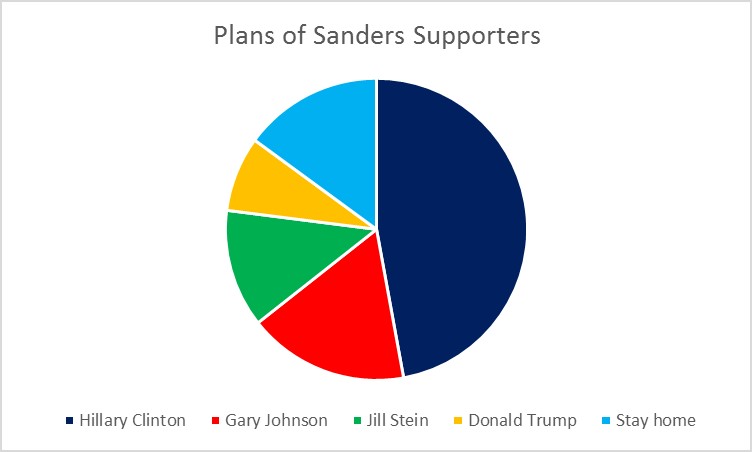Tuesday night saw Donald Trump’s best speech yet. In place of his standard off-the-cuff ramblings were prewritten remarks, allowing him to achieve great technical success. He did not employ the loud, rabble-rousing rhetoric of his arena-filling rallies but instead—perhaps for the first time—sounded “presidential.”
Interestingly, his emotional appeal sought not to inspire fear and frustration but, in a spirit strangely reminiscent of that of Obama in 2008, “real change —not Obama change—but real change.”
Trump’s formality—marked physically by the presence of heretofore unseen tele-prompters—might be a disappointment to his core supporters. But the candidate’s devotees need not fret. Trump’s speech on Tuesday night was likely a one-off. As the last day of voting, it was the official beginning of the general election campaign, in some ways providing the perfect moment for Trump adopt a more respectable, “presidential” aura.
But there is another reason Trump supporters will not miss their favorite firebrand for long—this speech wasn’t written for them. Sure, the nativism and populism which has resonated so strongly was there, but it was much subtler, much quieter.
This speech was, in part, for Bernie Sanders’ supporters. Trump welcomed “all of those Bernie Sanders voters who have been left out in the cold by a rigged system of superdelegates … with open arms.” He proceeded to speak about trade, an issue about which Sanders’ supporters and those of Trump share strong feelings. Trump assured Sanders’ backers that “the terrible trade deals that Bernie was so vehemently against,” which he mistakenly referred to as the PPP rather than the TPP, “will be taken care of far better than anyone ever thought possible.”
Moreover, with a clear eye on November, in one of the most compelling moments of the speech, Trump sought to tear Sanders supporters away from supporting Hillary Clinton by clearly defining himself as the populist opposition to the rich, well-connected former Secretary of State. Trump claimed that his opponent and her husband “have turned the politics of personal enrichment into an art form for themselves.”
Trump also made an appeal to African-American voters, seeming to repent for one of his recent gaffes— (at a rally in Redding, California on June 3, he called on his audience to “look at my African-American over here”). He spoke more compassionately than many Republicans ever have, committing “to take care of our African-American people that have been mistreated for so long.”
Perhaps most of all, this speech was Trump’s attempt to assuage the Republican establishment. While party leaders have begun to coalesce around Trump—however hesitantly—in recent weeks, the candidate needed to demonstrate a sense of temperament (Clinton has criticized Trump heavily on his raucous style of discourse). The presence of tele-prompters and this sudden deviation from his typical intensity and invective certainly broadcast a calmer image of the Republican presidential nominee.
The success of all these efforts is dubious at best. While the media has enjoyed speculating on the possibility that a notable portion of the Vermont senator’s backers will vote Republican in the fall, in reality this is highly unlikely. Social psychological research suggests most Sanders’ voters will ultimately choose Clinton because the two candidates’ value systems closely align. Polling conducted on the issue only affirms this proposition.

41 percent of Sanders supporters said they would vote for Hillary Clinton in the general election, as opposed to seven percent for Trump, according to a recent SurveyUSA poll for the Guardian.
More notable than its certain ineffectiveness, Trump’s attempt to repair relations with the African-American community was laughable. This solidly and staunchly Democratic demographic—arguably much more tuned into and vocal about issues related to racism and discrimination than at any other point in recent history—will not forget the candidate’s hateful language.
So, what about the Republican establishment? With this audience Trump found perhaps the most success. He had to prove to Republican leaders he could turn his bravado down a few notches, and he did so rather adequately
Of course, Republican leaders expect their candidate’s transfiguration to be only temporary—and rightly so. But the more discerning among them may find reason for disconcertion rather than satisfaction. In order to achieve a more “presidential” tone, Trump’s rhetoric, in some parts, sounded almost decidedly un-Republican. Beyond bashing the TPP and suggesting the plight of African-Americans is structurally rooted, he lamented the country’s crumbling infrastructure and sought to position himself as a champion of workers, whom Republicans have long neglected in favor for their more middle-class counterparts.
In the end, however, it hardly matters if mainstream Republicans see through Trump’s façade—he’s reshaped the party in his own image and seems to have the support to bring that vision to fruition.
Image Credit: Gage Skidmore/Flickr
